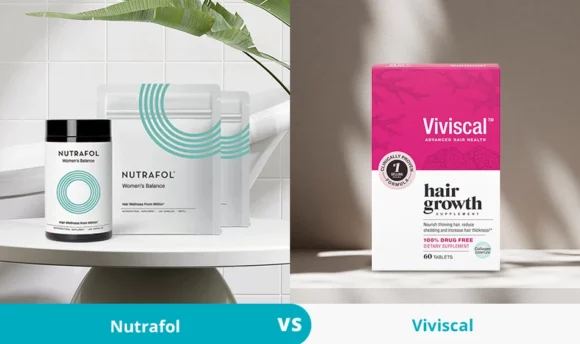Coconut Oil for Hair Growth: Unlock Your Hair's Potential
Is coconut oil good for your hair? Discover how coconut oil, an all-natural ingredient, can promote healthy hair growth and transform your tresses into luscious locks.

Coconut oil for hair growth has been the subject of much debate over the years. Many people swear by the miraculous benefits of this tropical oil for their hair, and it isn’t surprising to see why.
Loaded with vitamins and fatty acids, coconut oil is great for hair health. Its nourishing and moisturizing properties stimulate hair growth, repair damaged hair, and make your strands shinier and more voluminous.
So get ready to dive deep into the world of coconut oil for hair growth, explore the science behind it, and learn some handy tips and tricks for incorporating this tropical oil into your haircare routine for the best results.
Does Coconut Oil Help With Hair Growth?
According to several studies, coconut oil is incredibly beneficial for hair growth. This is primarily due to its unique combination of fatty acids and vitamins that penetrate the hair shaft and scalp, providing essential nourishment for overall hair health.
Additionally, coconut oil has antibacterial and antifungal properties that help prevent scalp infections and, thereby, hair loss.
What Is Coconut Oil?
Coconut oil is extracted from the flesh of ripe coconuts. What sets it apart from other natural oils, however, is that it consists primarily of medium-chain fatty acids (MCFAs), such as lauric, capric, and caprylic acid.
The MCFAs give coconut oil a long, straight molecular structure that allows it to better penetrate the hair shaft, strengthening it and preventing dryness and flakiness. Lauric acid, in particular, has a high affinity for hair proteins, preventing breakage and repairing the damage.
Additionally, the MCFAs have been found to have antibacterial properties. Meaning it can prevent microbial or fungal infections, such as dandruff, and keep the scalp healthy.
The 4 Main Benefits of Coconut Oil for Hair
Coconut oil is often referred to as “miracle oil.” Not only can consuming it be beneficial for weight loss but coconut oil can also be used to treat skin conditions and more. In fact, people have been using it for ages, and it isn’t surprising to see why.
So, what are the benefits of using coconut oil for hair growth? Here are 4 ways this simple ingredient can be transformative for your locks.
#1 Promotes hair growth
Coconut oil is packed with essential nutrients and fatty acids like lauric acid that nourish hair follicles and remove sebum. In addition, coconut oil massages improve blood circulation to the scalp, which promotes hair growth.
Furthermore, a study testing the effects of plant-based oils on human hair found that coconut oil could reduce protein loss, which is a leading cause of hair damage and breakage.
#2 Fights infections
Coconut oil is known for its potent antimicrobial properties, and there is evidence to prove this notion. According to a study conducted in 2021, applying coconut oil to the scalp was shown to have antifungal benefits. It kept the scalp area clean and free from infections and also promoted hair growth.
Similarly, another study found that the topical application of coconut oil was helpful in repairing the skin barrier. This makes it an excellent remedy for people who suffer from dandruff or scalp dryness.
#3 Moisturizes hair
Coconut oil is an excellent natural moisturizer for hair. The essential fatty acids in it penetrate the hair shaft, bind to the proteins, and thoroughly coat each hair strand.
The binding prevents protein loss, and the coating makes the hair water-repellant. The result is deep hydration and less frizz, especially in humid environments, leaving your hair looking and feeling healthier, shinier, and smooth.
#4 Boosts hair health
Coconut oil contains essential elements like vitamins E and K and minerals such as iron and zinc.
These nutrients nourish hair from the inside out and promote healthy hair growth by neutralizing free radicals that can otherwise lead to premature aging of the hair and hair loss.
The Side Effects of Using Coconut Oil on Hair
Coconut oil is generally considered safe to apply on hair. However, every coin has two sides, and the potential side effects to watch out for include the following:
#1 Greasy hair
Greasiness is one of the most common side effects of using coconut oil on your hair. Coconut oil’s unique composition makes it a heavy oil that, when used excessively, can make your hair look greasy and weighed down.
This is especially true for people with oily or thin hair. However, you can avoid this problem by using coconut oil in moderation and rinsing your hair thoroughly after 15–30 minutes.
#2 Allergic reactions
Although rare, some people are allergic to coconut oil. Therefore, using coconut oil on the hair may cause allergic reactions, such as itching, redness, or swelling of the scalp.
If you experience any of these symptoms after use, it is important to stop using coconut oil immediately and consult a medical professional.
#3 Acne breakouts
Coconut oil is highly comedogenic, meaning it can clog pores and lead to acne breakouts on the scalp and hairline. This is especially true for people with oily or acne-prone skin.
An easy way to avoid this is by using coconut oil sparingly and not applying it directly to the scalp.
#4 Dryness and brittle hair
Using too much coconut oil or not rinsing it out properly can lead to dry and brittle hair. This may sound counterintuitive since coconut oil is great for moisturizing hair, but it also coats your hair strands and repels water.
The key is to use coconut oil in moderation and to rinse your hair thoroughly after use. As with any beauty product, listening to your body and adjusting your routine accordingly can help make coconut oil work for your hair.
How to Apply Coconut Oil to Your Hair: A Step-by-Step Guide
When it comes to incorporating coconut oil into your haircare regime, there are two ways to go about it.
First, you can use coconut oil as a hair mask. This is a great way to help your hair absorb all the nutrients in the oil. Second, you can use it as a hair oil. This is a great way to give your hair a quick, daily conditioning treatment.
So how do you decide whether to use coconut oil as a hair mask or as a hair oil?
If your hair is dry, damaged, or in need of a deep conditioning treatment, using coconut oil as a hair mask is the way to go. However, if you’re looking for a daily treatment to protect and nourish your hair, using coconut oil as a hair oil may be ideal.
Also, if you have fine or thin hair, a coconut oil hair mask may make your hair look greasy. So using it as a hair oil may be a better option.
Now that you understand the two ways to use coconut oil on your hair, it’s time to look at the steps involved.
#1 Using coconut oil as a hair mask
Step 1: Measure out a generous amount of coconut oil, depending on the length and thickness of your hair. You want to make sure there is enough to cover your hair from root to tip.
Step 2: The next step is to heat the oil. You can do this either by placing a spoon in your hands or by placing the jar in warm water. This will help liquefy the oil so it’s easier to apply.
Step 3: Apply the coconut oil to your dry hair, starting at the roots and working your way down to the ends. Massage it into your scalp and distribute it evenly throughout your hair.
Step 4: Cover your hair with a shower cap or towel to keep the heat in. Leave the mask on for at least 30 minutes or overnight for deeper conditioning.
Step 5: Wash your hair using a gentle shampoo to remove the coconut oil. Ensure all the oil is out of your hair. Shampoo twice, if required, and dry your hair using a microfiber towel.
#2 Using coconut oil as a hair oil
Step 1: Start with clean, damp hair, as applying coconut oil to slightly damp hair will help it absorb the oil better.
Step 2: Rub a small amount of coconut oil between the palms of your hands to warm it.
Step 3: Apply the coconut oil to your hair, starting at the ends and working toward the roots. Avoid applying too much oil to your scalp. This can make your hair greasy.
Step 4: Style your hair as normal. The coconut oil will help tame frizz and leave your hair shiny and smooth.
Whichever method you choose, remember that with coconut oil, a little goes a long way. So start with a small amount and adjust as needed.
Which Coconut Oil Is Best for Hair Growth?
The haircare market is filled with coconut oil and products of many different types, so it can be tough to know which is best for your hair. To help you out, here is a closer look at the different types of coconut oil and how beneficial they are for hair health.
#1 Virgin coconut oil
Also known as unrefined or cold-pressed coconut oil, virgin coconut oil is the purest and most natural form of coconut oil. The extraction process involves pressing the fresh, white flesh of the coconut without the use of chemicals or heat.
Therefore, the end product, or virgin coconut oil, retains the natural antioxidants, vitamins, and minerals found in coconuts, making it an excellent choice for hair growth.
#2 Refined coconut oil
Refined coconut oil is made from copra, the dried flesh of the coconut. The process is not 100% natural, and the coconut oil goes through various chemical processes, such as bleaching, odor removal, lye neutralization, etc., before it reaches you.
People are more tempted to buy refined coconut oil because it is cheaper than virgin coconut oil. However, it is important to remember that it is also less beneficial for hair growth. This is because the refining process removes many of the nutrients found in coconuts, including lauric acid, which is the main component that promotes hair health.
#3 Coconut oil products
In addition to traditional coconut oil, there are many coconut oil-based hair products on the market, such as shampoos, conditioners, and hair masks. These products contain a combination of coconut oil with other ingredients that are claimed to promote hair growth or improve hair health.
However, it is necessary to check the ingredient list to make sure they don’t contain harmful substances before buying. Also, make sure it contains a significant amount of coconut oil.
So, what is the best coconut oil for hair growth?
Ultimately, virgin or extra virgin coconut oil is the best choice as it is minimally processed and retains most nutrients and essential fatty acids. Nonetheless, if you can’t find virgin coconut oil, look for refined coconut oil that has been minimally processed, like organic refined coconut oil.
FAQs
It is best to leave the coconut oil in your hair for about 30 minutes or overnight. However, if you have oily hair, it’s best to leave the coconut oil in for a shorter period of time, such as 30 minutes to an hour.
It’s not necessary to use coconut oil every day. Applying it to your hair 2–3 times a week can provide enough nourishment and moisture without causing buildup or greasiness.
The time it takes for coconut oil to work on your hair depends on several factors, including your hair type, the condition of your hair, and how often you use coconut oil. Typically, people start to see results after using coconut oil on their hair consistently for a few weeks.
A Word From a Trichologist
Coconut oil has been hailed as a hair miracle, largely due to its moisturizing and nourishing properties. If you are just beginning to incorporate coconut oil into your haircare routine, start with a small amount and distribute it evenly throughout your hair. Be sure to focus on the ends and avoid the roots to prevent greasiness.
Depending on your hair type, you can leave the oil on for 30 minutes or overnight. For example, if you have oily hair, it is best to wash out the coconut oil after 30–60 minutes. Then rinse out the oil with warm water and shampoo as usual.
Using coconut oil regularly on your hair can help improve its overall health and appearance. However, it’s important to note that coconut oil may not be suitable for everyone, particularly those with oily hair or a sensitive scalp. In some cases, coconut oil can lead to buildup or even cause an allergic reaction.
So, it’s always a good idea to patch-test a small area of your scalp before applying coconut oil all over your hair.
Here are some pro tips to get the most out of using coconut oil on your hair:
- Use virgin or cold-pressed coconut oil
- Apply coconut oil to damp hair for better absorption
- Comb the oil through your hair to ensure even distribution
- Use a shower cap or towel to keep the oil in your hair
- Experiment with different amounts and lengths of time to find what works best for your hair type and condition
Conclusion
Coconut oil is an excellent natural remedy for hair growth and health. Its nourishing and moisturizing properties help repair the damage, prevent breakage, and stimulate hair growth. With regular use, you can expect to see improved texture, shine, and strength.
Keep in mind, however, that coconut oil may not be suitable for everyone, especially those with oily hair or a sensitive scalp. Also, be sure to use coconut oil in moderation, as overuse can lead to buildup and greasiness.
If you’re not sure if coconut oil is right for you, consider consulting a healthcare professional or licensed trichologist.

















































 Select your language:
Select your language: 








